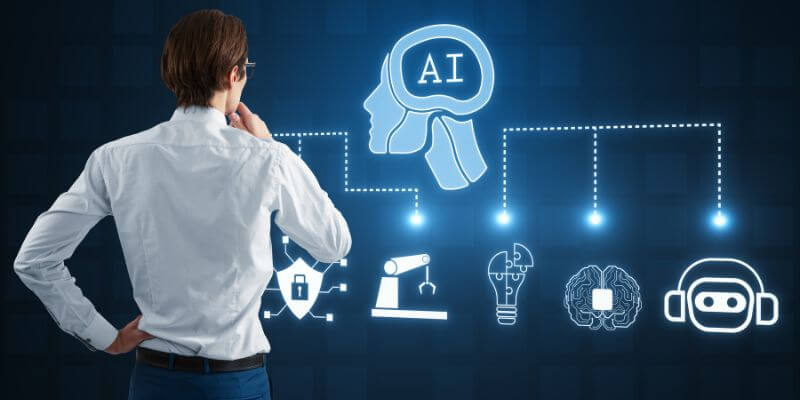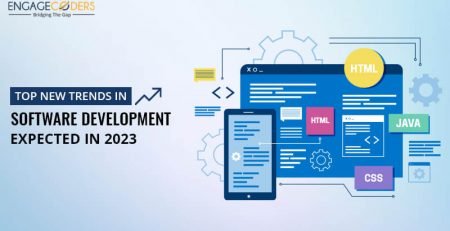Role Of Artificial Intelligence In Software Development!
In today’s fast-paced digital world, software development is undergoing a significant transformation, with the coming of artificial intelligence (AI). AI can not only assist you but also actively participate in the creation of software. AI is revolutionizing how developers work, making processes more efficient, intelligent, and simpler.
At its core, AI in software development involves machines learning from vast amounts of data, recognizing patterns, and making decisions with minimal human intervention. This means developers can automate repetitive tasks, optimize code, and even predict potential issues before they arise.

One of the most exciting aspects of AI in software development is its ability to enhance productivity and creativity. With AI-powered tools, developers can generate code, debug programs, and improve the user experience faster. Moreover, AI algorithms can continuously analyze user feedback and behavior to refine and evolve software products.
Here’s how AI impacts software development:
1. Automation:
Automation with AI makes life easier for developers by taking care of routine jobs, leaving them more time to focus on the fun and creative parts of making software.
With AI doing the heavy lifting, developers can work faster, smarter, and more efficiently. Plus, automation helps ensure that software is reliable and high-quality by catching errors early on. However, here are a few benefits listed below:
- Increased Efficiency: AI automates repetitive tasks such as testing, debugging, and code generation, saving developers valuable time and effort.
- Faster Development: With AI handling routine tasks, developers can focus on more complex and creative aspects of software development, accelerating the overall process.
- Improved Accuracy: AI-powered tools can identify and fix errors more accurately than humans, leading to higher-quality code and fewer bugs in the final product.
- Cost Savings: By reducing the need for manual intervention in various development stages, AI helps organizations save money on labor costs and enhance project profitability.
2. Enhanced Productivity:
Artificial intelligence (AI) plays a crucial role in enhancing productivity in software development. AI tools can automate repetitive tasks like code generation, debugging, and testing, saving developers precious time and effort. They can also analyze vast amounts of data to identify patterns and suggest improvements, making the development process faster and more efficient.
Additionally, by leveraging AI, software developers can focus more on creative problem-solving and innovation, rather than getting caught up in routine tasks.
Ultimately, AI boosts productivity by streamlining workflows, reducing errors, and empowering developers to build better software quickly. However, here are a few benefits of AI for enhancing productivity in software development.
- Automated Code Generation: AI tools can generate code snippets, templates, or even entire modules based on requirements, speeding up the development process.
- Bug Detection and Fixing: AI-powered tools can detect and fix code bugs, reducing developers’ time on debugging and troubleshooting.
- Code Optimization: AI algorithms can analyze code performance and suggest optimizations, leading to faster and more efficient software.
3. Predictive Analytics:
Did you know that in software development, the ability to predict future outcomes is becoming more attainable with (AI)? By analyzing past data, these technologies can forecast what might happen next.
This innovative approach is revolutionizing how software is built and managed, offering the potential to anticipate problems, streamline processes, and ultimately, create better products. However, here are a few benefits of predictive analysis listed below:
- Anticipating Problems: Predictive analysis with AI enables developers to foresee potential issues before they occur. By analyzing historical data and identifying patterns, AI can alert developers to potential bugs or glitches, allowing them to address them before they become significant problems proactively.
- Optimizing Processes: AI-driven predictive analysis can help streamline development processes by identifying inefficiencies and bottlenecks.
- Enhancing User Experience: Predictive analysis with AI can help developers better understand user behaviour and preferences. AI can provide insights into optimizing features and functionalities to meet user needs by analyzing user data such as usage patterns, feedback, and interactions.
4. Natural Language Processing (NLP):
NLP enables computers to understand and generate human language. This is particularly useful in developing conversational interfaces, chatbots, and virtual assistants, enhancing user interaction and experience. Moreover, NLP makes software smart enough to understand us, making our digital interactions smoother and more natural. Here are a few benefits of NLP:
- Improved user experience: NLP with AI enhances user interactions by allowing software to understand and respond to natural language queries.
- Efficient Data Analysis: NLP automates the extraction of insights from large volumes of text data, such as customer feedback, reviews, and support tickets.
- Enhanced Personalization: By analyzing natural language input, AI can tailor recommendations, content, and interactions better to meet the needs and preferences of each user, leading to increased user engagement and satisfaction.
- Streamlined Development Processes: NLP automates various tasks in the software development lifecycle, such as code documentation, bug tracking, and requirements gathering.
5. Machine Learning:
In software development, machine learning algorithms analyze large amounts of data and identify meaningful insights or patterns. Overall, it empowers software developers to create intelligent systems that can adapt and improve over time, enhancing the capabilities of AI-powered applications and services in various domains such as healthcare, finance, transportation, and more. However, here are the following benefits listed below:
- Improved Accuracy: AI-powered machine learning models can analyze large datasets and make highly accurate predictions or decisions. This leads to more reliable software solutions and better outcomes.
- Personalization: It enables software to personalize user experiences by analyzing user data and behavior.
- Scalability: Machine learning algorithms can scale to handle large volumes of data and adapt to changing requirements. This scalability makes them suitable for various applications and allows software systems to grow alongside the business.
6. Quality Assurance:
Quality assurance is essential in software development to ensure the final product meets the required functionality, reliability, and usability standards. Artificial intelligence (AI) is increasingly integrated into quality assurance processes to enhance efficiency and effectiveness.
Quality assurance involves using machine learning algorithms and other AI techniques to automate testing tasks, analyze test results, and identify defects or areas for software improvement. However, here are a few benefits listed below:
- Increased Test Coverage: AI algorithms can analyze vast amounts of data to generate comprehensive test cases and scenarios, covering a wider range of functionalities and edge cases. This leads to more thorough testing and helps identify potential issues early in development.
- Efficient resource utilization: AI algorithms can optimize test execution by prioritizing test cases based on their likelihood of finding defects. This ensures that QA resources are allocated effectively, maximizing test coverage while minimizing effort.
- Continuous Improvement: QA processes can continuously learn and adapt based on test results and user interaction feedback.
The Benefits of Artificial Intelligence for Developers
Artificial intelligence (AI) offers numerous advantages for developers across various fields of software engineering. From enhancing productivity to improving the quality of software products, AI technologies revolutionize how developers work and innovate. However, here are a few benefits listed below:
- Improved Code Quality: AI algorithms can analyze code patterns, identify potential bugs, and suggest optimizations, leading to cleaner, more efficient code. This results in higher-quality software products with fewer defects.
- Predictive Analytics: AI enables developers to analyze large datasets and predict future trends or user behavior. This helps make data-driven decisions and optimize software features for better user engagement and satisfaction.
- Personalized development environments: AI-powered development tools can adapt to individual developer preferences and workflows, providing personalized coding suggestions, auto-completion, and debugging assistance. This enhances the developer’s experience and efficiency.
- Advanced Problem-Solving: AI algorithms can tackle complex problems and find innovative solutions that may be beyond human capabilities. This enables developers to overcome challenges and create cutting-edge software solutions.
Moreover, AI offers various benefits for developers, ranging from increased productivity and code quality to personalized development environments and advanced problem-solving capabilities. By leveraging AI technologies, developers can streamline their workflows, produce higher-quality software products, and drive innovation in software engineering.
Challenges of using AI in software development:
Artificial intelligence (AI) presents numerous opportunities for enhancing software development processes but also comes with challenges. These challenges can range from technical complexities to ethical considerations and require careful attention and mitigation strategies from developers and stakeholders.
1. Data Quality and Availability:
In AI software development, data quality and availability can be a big challenge. Individuals need good data to teach AI algorithms, but finding enough high-quality data can be tough. Sometimes, the data needed is scarce, incomplete, or biased, which can affect the accuracy of their AI models. Developers spend a lot of time searching for and cleaning up data to ensure it’s suitable for training.
2. Algorithm Complexity:
Developing and implementing AI algorithms can be complex and resource-intensive. It requires expertise in machine learning, deep learning, other AI techniques, and computational resources for training and optimization. This complexity can make it challenging for developers to design and implement effective AI solutions. Developers must have expertise in machine learning, deep learning, and other AI techniques to navigate this complexity successfully.
3. Interpretability and Transparency:
Interpretability and transparency are challenges when using AI in software development. It means being able to understand and explain how AI systems make decisions. Developers must find ways to make AI systems more transparent and easier to understand. This involves making AI algorithms more explainable and providing insights into their inner workings for better understanding and trust.
4. Ethical and bias concerns:
Ethical and bias concerns arise when using AI in software development. This means being worried about whether AI systems are fair and unbiased. For example, if the data is biased against certain groups of people, the AI might make unfair decisions. Developers need to be mindful of these concerns and take steps to minimize bias in AI algorithms. This involves carefully selecting and cleaning data, testing for fairness, and continuously monitoring AI systems to ensure they treat everyone fairly.
5. Integration and Compatibility:
Integrating AI technologies into existing software systems and workflows can be challenging. Compatibility issues, such as legacy systems, may prevent seamless integration, requiring additional time and resources.
Developers must find ways to make AI technologies compatible with different platforms and frameworks. This involves adapting AI models to fit the requirements of the existing software, ensuring smooth communication between different components, and testing for compatibility issues to ensure everything works seamlessly together.
Partner with our Digital Marketing Agency
Ask Engage Coders to create a comprehensive and inclusive digital marketing plan that takes your business to new heights.
Wrapping up:
Software development is evolving due to artificial intelligence. It facilitates quicker work, better code writing, and problem-solving. The advantages of utilizing AI in software development are enormous, making our systems smarter and more effective despite certain difficulties, such as obtaining high-quality data and comprehending complicated algorithms.
One of the top digital marketing companies in the USA is Engage Coder, which offers comprehensive solutions. With our extensive experience, we are committed to increasing revenue and achieving success for our customers.
Accelerate your business growth with our expertise – get a free quote now!













